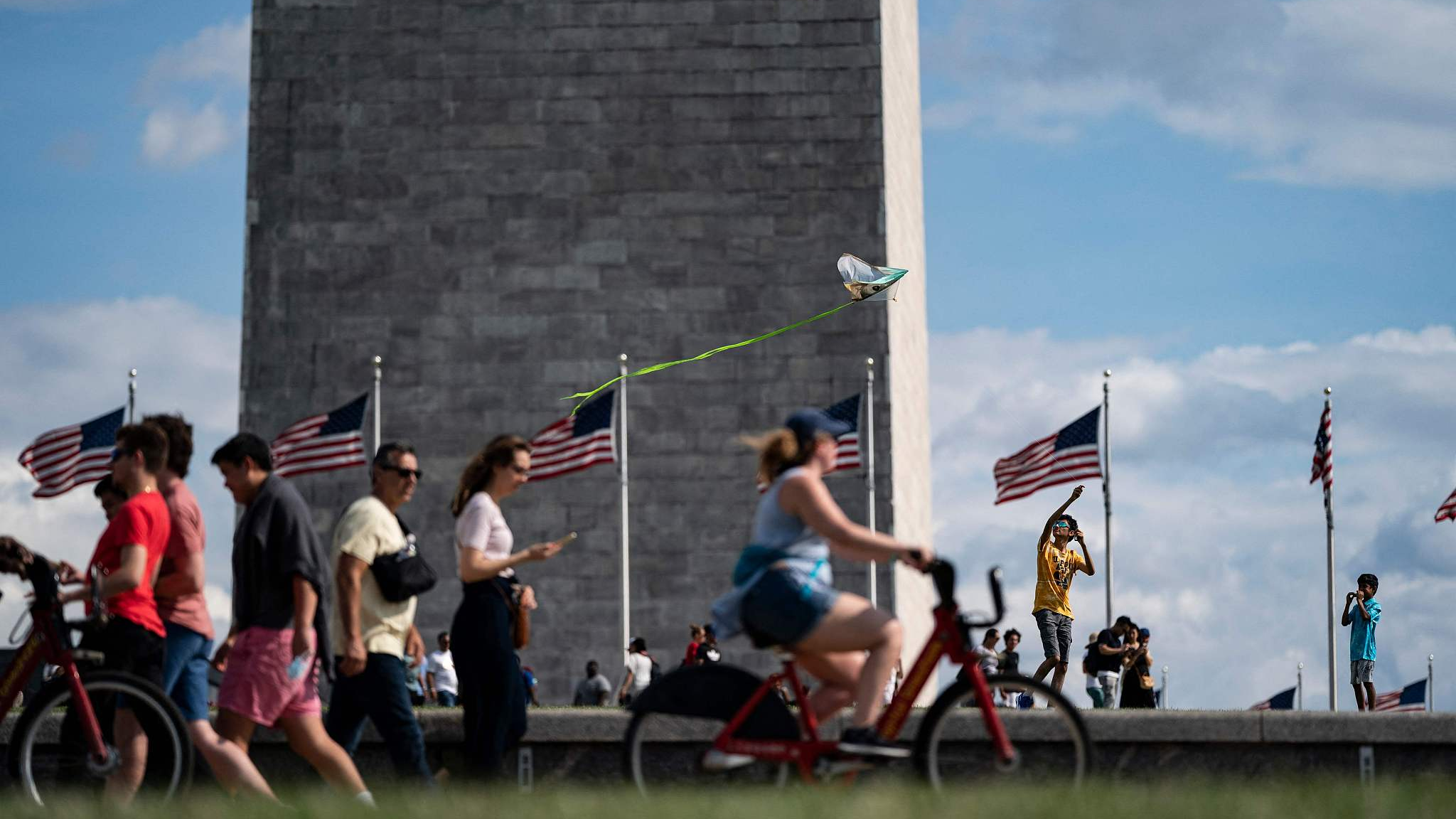
A visitor flies a kite near the foot of the Washington Monument on the National Mall in Washington, D.C., July 3, 2021. /VCG
A visitor flies a kite near the foot of the Washington Monument on the National Mall in Washington, D.C., July 3, 2021. /VCG
Editor's note: Hannan Hussain is a foreign affairs commentator and author. He is a Fulbright recipient at the University of Maryland, the U.S., and a former assistant researcher at Islamabad Policy Research Institute. The article reflects the author's opinions and not necessarily the views of CGTN.
"The rich inheritance of justice, liberty, prosperity and independence, bequeathed by your fathers, is shared by you, not by me. The sunlight that brought life and healing to you has brought stripes and death to me. This Fourth [of] July is yours, not mine."
These were the words from Frederick Douglass – former slave, prolific speaker and abolitionist – in a speech he delivered in 1852, shortly after America's 76th birthday. Almost every other year, Douglass' words gather in the minds of many Americans. Yet, to remind a nation that its discord between stated and practiced commitments to freedom, liberty and equality is very much alive.
America's popular constructs of centuries-old independence align with the belief that it is a nation largely resistant to foreign repression, with a penchant for human liberties by speech, association, individual preference, and democratic continuity. But critical chapters in its history, such as the extrication of American society from slavery and an acclaimed civil-rights movement, yearn for consideration today when a record percentage of Americans view nationwide crime with the highest alarm in decades, and citizen trust in governance borders on a fraction.
More important than ever is a leaf from the country's turbulent history when those omitted from the vision of America's founding fathers find their annual protest symbolism wane in the background of commercial celebrations.
More recent indictments of the ideal American democracy also include the triple perils of gun violence, a widening racial wealth gap and right-wing populism. All three have cast a shadow on the country's domestic priorities for fair governance.
Consider how the past year has delivered a vital lesson on the U.S. constitution's own divided reception among the masses. The constitution was not simply seen as a guarantor of equal rights for protesters but was invoked by violent mobs as a justification to terrorize lawmakers, confine American liberties to the rage of white privilege, and work towards a scenario where fervent nationalism – and not a binding social contract – determines who gets to govern, and what it means to be American.

People sell gifts and clothes ahead of July 4, on the National Mall in Washington, D.C., July 3, 2021. /VCG
People sell gifts and clothes ahead of July 4, on the National Mall in Washington, D.C., July 3, 2021. /VCG
"We will be judged by future generations as to how we value our democracy," remarked Democratic House Speaker Nancy Pelosi ahead of the chamber's newly launched investigation into the January Capitol riot this week.
One of the world's oldest modern democracies – stretching well over 200 years – can't even get at the roots of a siege barely 200 days old? It is a staggering sight that demonstrates just how much America has to reflect on July 4 – far beyond the bustle of annual celebrations that keeps such a sober moment from arriving.
In terms of foreign policy, the domestic determinants of American exceptionalism abroad reflect the country's fraught marriage between state and people. The former's disproportionate use of force against underrepresented communities at home mirrors its exercise of disproportionate U.S. military force around the world. From South Asia to the Middle East, entire communities have been brought to their knees.
And yet, the U.S. force posture that contributed to the eclipse of sovereign liberties is without retreat, and instead, is reintroduced as a lever for escalation elsewhere in the world, operating under the garb of a "rules-based order."
It is true that a long habit of not thinking a thing wrong, gives it the superficial appearance of being right. On America's 245th birthday, citizens and lawmakers may find some comfort in a long-sought economic recovery, growing space for socially equitable legislation, and a tearful departure from nearly 50,000 new daily COVID-19 cases same time last year.
But all that is mere symbolism if the historic holdovers of institutionalized discrimination, foreign repression, ideological supremacy and fervent populism aren't recognized as clear threats to America's very libertarian principles.
July 2009 is a case in point. The country's first-ever Black president addressed American Independence Day spirit from a house of power built by slaves. One could be forgiven for interpreting such moments as America's chance to cut through racial divisions, or to dress up its dominant foreign policy objectives as a force for global good.
But as Barack Obama's own historic chapter in American politics would later reveal, a mere change in a presidential administration is barely enough to set right America's warped sense of national independence, even with Biden succeeding Trump: "Having the son of a Black African with a Muslim name and socialist ideas ... with the full force of the U.S. government under his command was precisely the thing they [fellow American citizens] wanted to be defended against," recalled Obama in his memoirs.
Thus born is the central question on American independence: can a country make peace with a past it is yet to learn from?
(If you want to contribute and have specific expertise, please contact us at opinions@cgtn.com.)

